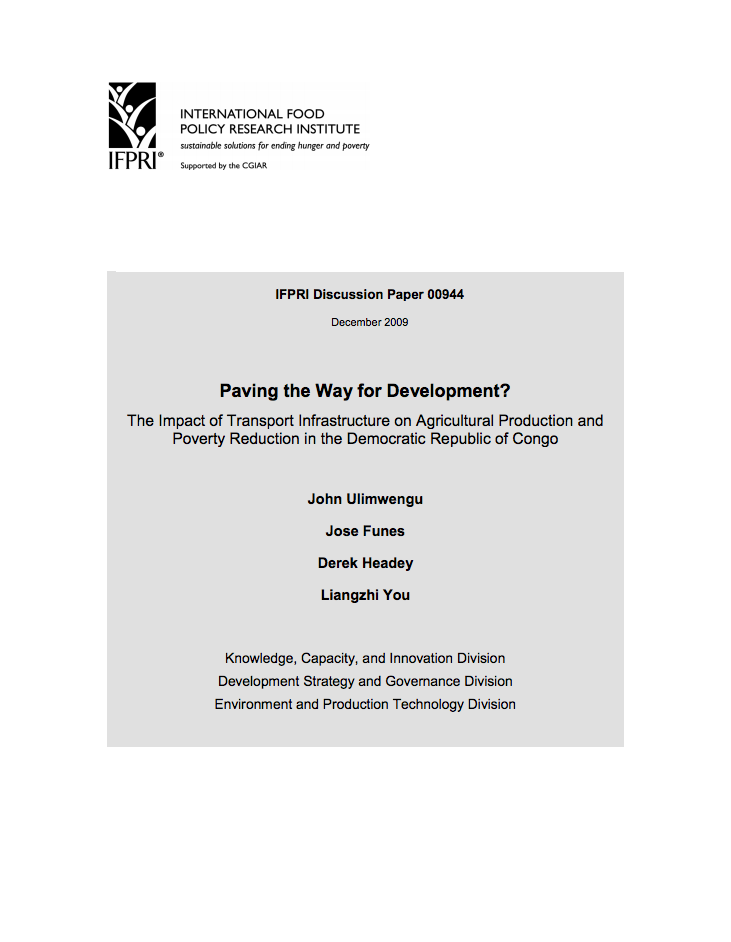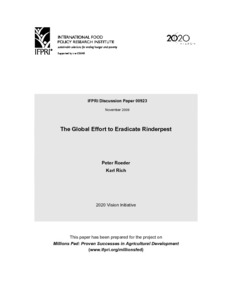Focal point
Location
About IFPRI
The International Food Policy Research Institute (IFPRI) provides research-based policy solutions to sustainably reduce poverty and end hunger and malnutrition in developing countries. Established in 1975, IFPRI currently has more than 500 employees working in over 50 countries. It is a research center of theCGIAR Consortium, a worldwide partnership engaged in agricultural research for development.
Vision and Mission
IFPRI’s vision is a world free of hunger and malnutrition. Its mission is to provide research-based policy solutions that sustainably reduce poverty and end hunger and malnutrition.
What We Do
Research at IFPRI focuses on six strategic areas:
- Ensuring Sustainable Food Production: IFPRI’s research analyzes options for policies, institutions, innovations, and technologies that can advance sustainable food production in a context of resource scarcity, threats to biodiversity, and climate change. READ MORE
- Promoting Healthy Food Systems: IFPRI examines how to improve diet quality and nutrition for the poor, focusing particularly on women and children, and works to create synergies among the three vital components of the food system: agriculture, health, and nutrition. READ MORE
- Improving Markets and Trade: IFPRI’s research focuses on strengthening markets and correcting market failures to enhance the benefits from market participation for small-scale farmers. READ MORE
- Transforming Agriculture: The aim of IFPRI’s research in this area is to improve development strategies to ensure broad-based rural growth and to accelerate the transformation from low-income, rural, agriculture-based economies to high-income, more urbanized, and industrial service-based ones. READ MORE
- Building Resilience: IFPRI’s research explores the causes and impacts of environmental, political, and economic shocks that can affect food security, nutrition, health, and well-being and evaluates interventions designed to enhance resilience at various levels. READ MORE
- Strengthening Institutions and Governance: IFPRI’s research on institutions centers on collective action in management of natural resources and farmer organizations. Its governance-focused research examines the political economy of agricultural policymaking, the degree of state capacity and political will required for achieving economic transformation, and the impacts of different governance arrangements.
Research on gender cuts across all six areas, because understanding the relationships between women and men can illuminate the pathway to sustainable and inclusive economic development.
IFPRI also leads two CGIAR Research Programs (CRPs): Policies, Institutions, and Markets (PIM) andAgriculture for Nutrition and Health (A4NH).
Beyond research, IFPRI’s work includes partnerships, communications, and capacity strengthening. The Institute collaborates with development implementers, public institutions, the private sector, farmers’ organizations, and other partners around the world.
Resources
Displaying 751 - 755 of 1521Contract farming in Sub-Saharan Africa: lessons from cotton on what works and under what conditions
Paving the Way for Development?
Given its vast land resources and favorable water supply, the Democratic Republic of Congo’s (DRC’s) natural agricultural potential is immense. However, the economic potential of the sector is handicapped by one of the most dilapidated transport systems in the developing world (World Bank 2006). Road investments are therefore a high priority in the government’s investment plans and those of its major donors.
The Global Effort to Eradicate Rinderpest
During the past 70 years, concerted efforts by the national veterinary services of affected countries from Senegal to China and Russia to South Africa—aided by international organizations—have brought the once-dreaded rinderpest virus to the point of extinction. In the near future, we can expect to see a global declaration of freedom from rinderpest, the first time this has been achieved for a livestock disease. The devastation wrought by rinderpest stimulated the founding of veterinary schools in many countries, and provided the basis for the development of the veterinary profession.
“Land Grabbing” by Foreign Investors in Developing Countries: Risks and Opportunities
Includes rising land acquisition in developing countries; threats and opportunities from large-scale land acquisitions; making a virtue of necessity: toward win-win policies; 5 tables of media reports on overseas land investments to secure food supplies, 2006-09.
“Land grabbing” by foreign investors in developing countries. Risks and opportunities
One of the effects of the food price crisis on the world food system is the increasing acquisition of farmland in developing countries by other countries seeking to ensure their food supplies.This brief analyses the pros and cons of land acquisitions in developing countries by capital rich economies. It argues that acquisitions have the potential to inject much needed investment into agriculture and rural areas in poor developing countries resulting into creation of farm and off-farm jobs and development of rural infrastructure.







